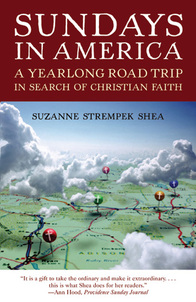
Protestant church every Sunday for a year. She wanted to see why other people were drawn to church like herself.
Church Geeks
I found her reflections fascinating. Those of us who work in the church have conversation after conversation of what is the magic formula for getting people “in the pews.” We know there are more and more people who do not identify themselves with a worship community anymore.
Church geeks like myself, who are serious about church, wonder: What will reach people and get them to experience our community and worship? We believe it is where people should be. How do we share that and have them know we want them here with us?
We talk about the details: traditional liturgy vs. event–style worship; praise music vs. traditional hymns; screens vs. hymnals; short services vs. long; Sunday morning vs. Saturday night; and it goes on and on. Some who have distanced themselves from church may roll their eyes at conversations like that and cynically wonder if those details are all church professionals care about? One thing I realized as I read about all the different experiences the author had in visiting churches is that those details are important. They make the experience of worship unique to that place. For church goers, we want to feel like our church is a place we belong and where we feel the Spirit working. So those details are important.
But…another thing I was reminded of in the book is that when the focus of the conversation stops at those details and does not extend to how God is at work in the people there and in the world, then the experience seems less than authentic – at the least to author. And I tended to agree with her.
The author’s year
It was fascinating to read about her experiences in each of these protestant churches. A result of her strong
Catholic background was that she brought knowledge of and a love of liturgy and rhythm of the church year with her. That was the primary lens in which she observed each church. I think that surprised her. She didn’t know that was such a part of her until it was missing. As a Lutheran, I have that same lens.
She chose some churches for very practical reasons. She needed to visit a certain kind of church to check it off her list and Southwest Airlines had a good fare. Though the reason for going may not have been one of theology, she almost always found some inspiration from worship to take with her and encourage her during the
week.
Some churches were chosen for specific reasons:
· She visited the chapel at West Point Military Academy on the Sunday before Memorial Day hoping for prayers and acknowledgment of the soldiers who were sacrificing their lives in the Iraq War. (Her visits were in 2006.) She was deeply disappointed when there was not one mention of fallen soldiers or the sacrifice they made for our country.
· She visited Maranatha Baptist Church in Plains, Georgia where President Jimmy Carter attends and still teaches Sunday School.
· She went to San Francisco to worship at Saint John Will-I-Am Coltrane African Orthodox Church. She had no idea what to think and was delighted when the 3 hour service was heartfelt, intimate and touched her soul.
· The decision to find a church in Las Vegas (Sin City) to begin the Lenten season was deliberate and with a touch of ironic humor. What she found was people intentionally worshiping God and looking for meaning in their lives. It was a very small group gathered (5 people!), but it became one of her favorite moments.
· She also visited famous mega-churches: Lakewood Church in Texas (Joel Osteen’s church) and Saddleback Church in California (Rick Warren’s church). I will let you read about those experiences for yourself.
Her Lutheran experience
I will be honest. I felt relief when she went to a Lutheran church and had a good experience. I saw in the table of contents she only visited one and I so wanted her to have the same deep experience I have at my church. She visited Kountze Memorial Lutheran Church in Omaha, Nebraska. She chose Kountze Memorial because it was the first Lutheran church founded west of the Mississippi River in 1858. It was one of the few churches all year that she felt comfortable (because of the traditional liturgy similar to her faith) and challenged (by a well written and well delivered sermon). The inclusive theology and doctrine of the ELCA (the larger Lutheran church body to which this congregation belongs), felt like a wash of grace showering her after hearing negative exclusionary doctrine and speech in so many other places of worship.
As she finished her journey, the author was left with profound memories of people. People warmly welcoming her into a place where she was clearly a visitor. People praying for and with her. People called by God (not just clergy) to work for justice in the world. People sharing their varied gifts of music to worship God.
Can you tell I enjoyed reading this book? I think it is a good read not only for “church geeks” like me. I think it is for all of us, searchers and regular church goers, who feel that sacred connection to God and want to be in a community of faith to support, challenge and encourage each other.
I’ll conclude with the words that sent worshipers at Saint John Will-I-Am Coltrane African Orthodox Church:
“Let us arise from this place and be busy about the things of God.”
~ Pam
PS: God certainly has a sense of humor – the same day I read about her visit to the Kingdom Hall of Jehovah’s Witnesses in Oregon, one of their tracts showed up on my front door!
